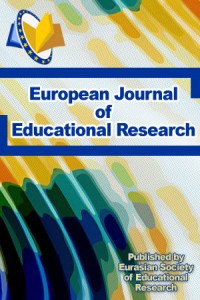Öz
Authors reflect the cultural codes of the societies they live in. When these cultural codes are decoded by the reader, it becomes easier to perceive the work in many aspects and make textual productions from the text. In this study, Iranian author Samed Behrengi’s 10 story books which have also been popular in Turkey have been analysed in terms of text-space. First of all, the concept of space in the story books has been reviewed with a general screening method and then it is examined in depth. Thus, it was revealed how the dimensions of the research will be shaped. In the study, information about the space is coded and read through the texts. In this context, the contribution of space to text and text formation is discussed. In order for the spatial reading to take place, the author needs to make good observations. In this respect, Samed Behrengi, who is the subject of the research, has also objectively reflected the spaces he uses in his books as a good observer, and these places are the elements that will provide the reader with a cultural dimension. In the end of the study, 23 private spaces (living space) and 180 public spaces have been identified. Consequently, it is seen that if the students/readers who read the author’s books are steered to geographical reading, their perception of space will be enriched.
Anahtar Kelimeler
Kaynakça
- Ayata-Senoz, C. (2005). Metin dilbilim ve Turkce [Textology and Turkish]. Istanbul, Turkey: Multilingual.
- Ertan, G. G. (2011). Samed-i Behrengi’nin hikayeciligi ve Iran cocuk edebiyatindaki yeri [Samed-i Behrengi's storytelling and its place in Iranian children's literature]. Selcuk University the Journal of Institute of Social Sciences, 26, 163-171.
- Erturk, M. (2013). Mekanin diyalojisi kent mekani- kent oznesi [Dialogue of space urban space- city subject] (Unpublished doctoral dissertation). Istanbul Bilgi University, Istanbul, Turkey.
- Esen, N. (2002). Ahmet Mithat'ta kronotop kavrami [Chronotope concept in Ahmet Mithat].Vesika-lik Journal, 137-139.
- Gurbuz, S., & Sahin, F. (2017). Sosyal bilimlerde arastirma yontemleri felsefe-yontem-analiz [Research methods in social sciences philosophy-method-analysis ]. Ankara, Turkey: Seckin.
- Guresir, S. K. (2015). Ihanetin mekanindan mucadele ve kurtulusun mekanina: Nazim Hikmet'in kuvayi milliye siirlerini cografya merkezli okuma denemesi [From the space of betrayal to the space of salvation and salvation: Nazim Hikmet's attempt to read kuvayi milliye poems based on geography]. Trakya University Journal of Faculty of Letters, 5(9), 133-143.
- Isik, E., & Senturk, Y. (2009). Ozneler, durumlar ve mekanlar- Toplum ve mekan: mekanla kurgulamak: [Subjects, situations and spaces- Society and space: fiction in space.]. Istanbul, Turkey: Baglam.
- Kacmaz, P., & Kacmaz, M. (2017). Edebiyat cografyasi; Elif Safak romanlarinda cografi unsurlar. [Geography of literature; geographical elements in the novels of Elif Safak]. Journal of Strategic Research in Social Science, 3(4), 1-20.
- Kantar, D. (2004). Tur uzerine kavramsal bir tanimlama denemesi [Towards a conceptual definition of genre]. Dil Dergisi [Language Journal], 123, 7-18. http://doi.org/10.1501/Dilder_0000000006
- Kefeli, E. (2009). Cografya merkezli okuma [Geography centered reading]. Electronic Turkish Studies, 4(1), 423-433.
- Olcer, E. (2003). Turkiye masallarinda toplumsal cinsiyet ve mekan iliskisi [Gender and relationship to place in Turkey tales] (Unpublished doctoral dissertation). Bilkent University, Ankara, Turkey.
- Somer, P. M. (2006). Mimarlik ve bilimkurgu edebiyatinda mekan okumalari [Space reading in architecture and sci-fi literature] (Unpublished master’s thesis). Istanbul Technical University, Istanbul, Turkey.
- Tumer, G. (1984). Insan-mekan iliskileri ve Kafka [Human-space relations and Kafka]. Izmir, Turkey: Sanat-Koop. Yazici, N. (2002). Halikarnas Balikcisi’nin eserlerinde tabiat [Nature in the works of Halikarnas Balikcisi]. Ankara, Turkey, Turk Tarih Kurumu.
Öz
Kaynakça
- Ayata-Senoz, C. (2005). Metin dilbilim ve Turkce [Textology and Turkish]. Istanbul, Turkey: Multilingual.
- Ertan, G. G. (2011). Samed-i Behrengi’nin hikayeciligi ve Iran cocuk edebiyatindaki yeri [Samed-i Behrengi's storytelling and its place in Iranian children's literature]. Selcuk University the Journal of Institute of Social Sciences, 26, 163-171.
- Erturk, M. (2013). Mekanin diyalojisi kent mekani- kent oznesi [Dialogue of space urban space- city subject] (Unpublished doctoral dissertation). Istanbul Bilgi University, Istanbul, Turkey.
- Esen, N. (2002). Ahmet Mithat'ta kronotop kavrami [Chronotope concept in Ahmet Mithat].Vesika-lik Journal, 137-139.
- Gurbuz, S., & Sahin, F. (2017). Sosyal bilimlerde arastirma yontemleri felsefe-yontem-analiz [Research methods in social sciences philosophy-method-analysis ]. Ankara, Turkey: Seckin.
- Guresir, S. K. (2015). Ihanetin mekanindan mucadele ve kurtulusun mekanina: Nazim Hikmet'in kuvayi milliye siirlerini cografya merkezli okuma denemesi [From the space of betrayal to the space of salvation and salvation: Nazim Hikmet's attempt to read kuvayi milliye poems based on geography]. Trakya University Journal of Faculty of Letters, 5(9), 133-143.
- Isik, E., & Senturk, Y. (2009). Ozneler, durumlar ve mekanlar- Toplum ve mekan: mekanla kurgulamak: [Subjects, situations and spaces- Society and space: fiction in space.]. Istanbul, Turkey: Baglam.
- Kacmaz, P., & Kacmaz, M. (2017). Edebiyat cografyasi; Elif Safak romanlarinda cografi unsurlar. [Geography of literature; geographical elements in the novels of Elif Safak]. Journal of Strategic Research in Social Science, 3(4), 1-20.
- Kantar, D. (2004). Tur uzerine kavramsal bir tanimlama denemesi [Towards a conceptual definition of genre]. Dil Dergisi [Language Journal], 123, 7-18. http://doi.org/10.1501/Dilder_0000000006
- Kefeli, E. (2009). Cografya merkezli okuma [Geography centered reading]. Electronic Turkish Studies, 4(1), 423-433.
- Olcer, E. (2003). Turkiye masallarinda toplumsal cinsiyet ve mekan iliskisi [Gender and relationship to place in Turkey tales] (Unpublished doctoral dissertation). Bilkent University, Ankara, Turkey.
- Somer, P. M. (2006). Mimarlik ve bilimkurgu edebiyatinda mekan okumalari [Space reading in architecture and sci-fi literature] (Unpublished master’s thesis). Istanbul Technical University, Istanbul, Turkey.
- Tumer, G. (1984). Insan-mekan iliskileri ve Kafka [Human-space relations and Kafka]. Izmir, Turkey: Sanat-Koop. Yazici, N. (2002). Halikarnas Balikcisi’nin eserlerinde tabiat [Nature in the works of Halikarnas Balikcisi]. Ankara, Turkey, Turk Tarih Kurumu.
Ayrıntılar
| Birincil Dil | İngilizce |
|---|---|
| Konular | Eğitim Üzerine Çalışmalar |
| Bölüm | Araştırma Makalesi |
| Yazarlar | |
| Yayımlanma Tarihi | 15 Temmuz 2019 |
| Yayımlandığı Sayı | Yıl 2019 Cilt: 8 Sayı: 3 |


